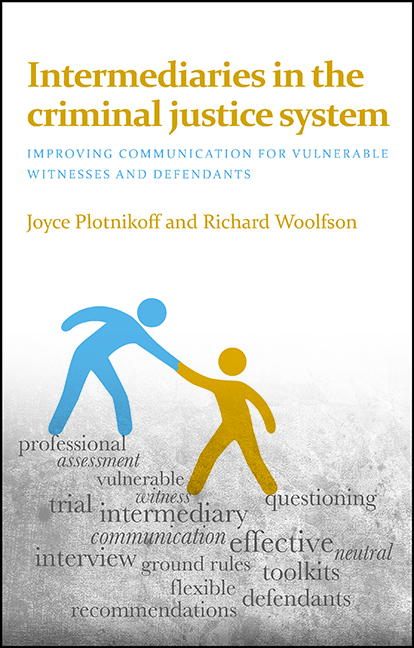 Intermediaries in the Criminal Justice System
Intermediaries in the Criminal Justice System Book contents
- Frontmatter
- Contents
- About the authors
- The Nuffield Foundation
- Acknowledgements
- Foreword
- one Introduction: a fresh pair of eyes
- two The intermediary scheme in England and Wales
- three Behind the scenes: planning to assess the witness
- four Assessment methods and involvement of the interviewer
- five Communication aids and stress reduction strategies
- six Contributing to the effectiveness of the police interview
- seven Negotiating professional space at the ground rules hearing
- eight Making the ground rules hearing effective
- nine ‘Every reasonable step’: preparation for giving evidence
- ten Cross-examination: research, case law, training and regulation
- eleven Cross-examination: intervention at trial
- twelve Cross-examination: challenges at the cutting edge
- thirteen The uneasy position of vulnerable defendants
- fourteen A new profession
- fifteen Conclusion
- References
- Index
- Table of cases
- Legislation
- Rules
- Practice directions
ten - Cross-examination: research, case law, training and regulation
Published online by Cambridge University Press: 08 March 2022
- Frontmatter
- Contents
- About the authors
- The Nuffield Foundation
- Acknowledgements
- Foreword
- one Introduction: a fresh pair of eyes
- two The intermediary scheme in England and Wales
- three Behind the scenes: planning to assess the witness
- four Assessment methods and involvement of the interviewer
- five Communication aids and stress reduction strategies
- six Contributing to the effectiveness of the police interview
- seven Negotiating professional space at the ground rules hearing
- eight Making the ground rules hearing effective
- nine ‘Every reasonable step’: preparation for giving evidence
- ten Cross-examination: research, case law, training and regulation
- eleven Cross-examination: intervention at trial
- twelve Cross-examination: challenges at the cutting edge
- thirteen The uneasy position of vulnerable defendants
- fourteen A new profession
- fifteen Conclusion
- References
- Index
- Table of cases
- Legislation
- Rules
- Practice directions
Summary
This chapter summarises research on leading questions, showing that they undermine witness accuracy and pose a high risk for the quality of evidence of vulnerable witnesses. It then considers a series of Court of Appeal decisions which together signal the need for a changed approach from advocates and further empower judges to control cross-examination of vulnerable witnesses. These cases have greatly strengthened the ability of intermediaries to challenge conventional cross-examination strategies.
The chapter also reviews the provision of relevant training for the judiciary and advocates and regulation of the advocacy professions. The Judicial College has wholeheartedly incorporated the Court of Appeal’s approach; the professions have yet to adopt an equivalent advocacy training requirement and regulation of advocacy standards has been strongly resisted. The response of those responsible for advocacy training has been slow at best, resistant at worst and, until recently, has lacked leadership. By default, intermediaries and judges (themselves still absorbing the new judicial training) find themselves playing a case by case educational role with advocates.
Cross-examination and research
Cross-examination is ‘the greatest legal engine ever invented for the discovery of truth’. (Wigmore, 1974, para 1367 at 32)
[E]mpirical evidence shows that [cross-examination] is a process that manufactures inaccurate evidence. (Cossins, 2012, p 111)
Perhaps the greatest skill comes from the ability to control the witness. Short answer questions, preferably ‘yes’ or ‘no’ answers allow the lawyer to dictate the examination … An artful examiner will lead a witness … down the primrose path and then, when they least expect it, slam the garden gate on them. (Meehan, 2011)
The objective of cross-examination in our adversarial system is to persuade the opposition’s witnesses to change their version of events or to discredit their evidence (for a helpful discussion, see Hanna et al, 2010). Accordingly, questions that lead the witness by suggesting the answer and inviting the witness to agree are the preferred form. Advocacy training encourages cross-examiners to control responses and substitute their case for the witness’s damaging testimony (for example, Hobbs, 2002, 2003; Hampel et al, 2008).
Several decades of research across common law jurisdictions shows that leading questions, along with other cross-examination techniques such as complex vocabulary and multi-part questions asked out of chronological order, mislead and confuse children and vulnerable adult witnesses (for example, Ellison, 2001; Hanna et al, 2010).
- Type
- Chapter
- Information
- Intermediaries in the Criminal Justice SystemImproving Communication for Vulnerable Witnesses and Defendants, pp. 155 - 186Publisher: Bristol University PressPrint publication year: 2015


